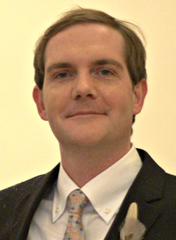 Interview conducted by Jennifer D. Foster
Interview conducted by Jennifer D. Foster
Have you ever wondered what fellow editors like to read? We have, too. In our interview series “By the Book,” we get the inside scoop on editors’ all-time favourite books, their top style guides, and what their alternate-universe careers would be.
Tell us about your current job, Joe, plus a little-known quirky fact about you.
I currently work in-house as a senior editor for Carswell. I edit, typeset, and also research material for loose-leafs and books on a variety of legal topics.
A quirky fact? Umm…I don’t put much stock in it, but I’ve been told I have a photographic, or eidetic, memory. It’s either that or my reading habits, below.
What is your all-time favourite book and why?
As other interviewees have mentioned, this is an impossible question to answer. My reading usually follows its own path. That is, I’ll read something that alludes to, or is influenced by, another work, and I’ll then seek those works out. Recently, I read Zadie Smith’s NW. That led me to reread David Foster Wallace and Nietzsche. Then, after the disappointing finale of HBO’s True Detective and having read Nietzsche, I read Thomas Ligotti’s The Conspiracy Against the Human Race and reread Ovid’s Metamorphoses. I’ll pick up almost anything to satisfy curiosity or to quench the need for understanding.
What is your favourite editing manual, style guide, or other book about editing/writing?
My go-to guide is The Chicago Manual of Style (CMS), now the 16th edition. Even during difficult author-editor relations, when changes are bluntly rejected, I can curl up in the fetal position with the CMS and know that everything is going to be okay.
What do you think you’d be doing if you weren’t an editor and why?
I’d be either a writer or a lawyer. A writer, because growing up I was always writing plays or fiction—not very good ones at that, mind you. I guess that quip that every editor is a failed writer has some validity in my case. And a lawyer, because a story’s validity or logic always seems to be in question.
Jennifer D. Foster is a Toronto-based freelance editor and writer, specializing in book and custom publishing, magazines, and marketing and communications.
This article was copy edited by Michelle Schriver.
